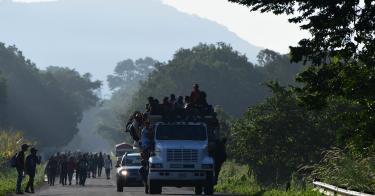A caravan of more than 7,000 Central Americans is descending on the United States. Like millions of foreigners, they want to live in the U.S. But these people are doing it their way—refusing to participate in our extensive legal immigration process.
Most will probably attempt to claim asylum when they get to the border. None should get it, for multiple reasons.
Under federal law (8 U.S.C. 1101(a)(42)), to be granted asylum, an alien must prove that he faces persecution, or has a “well-founded fear of persecution,” in his native country “on account of race, religion, nationality, membership in a particular social group, or political opinion.” Yet media interviews with those marching toward the border leave little doubt that the vast majority are coming for economic reasons. That doesn’t fit within the statutory requirement for asylum.
While asylum may be granted to those fleeing persecution, the applicable immigration statute (8 U.S.C. 1158(b)) doesn’t require it. Rather, that decision is left to the discretion of the attorney general or the secretary of homeland security.
Attorney General Jeff Sessions pointed this out in a June immigration decision involving an illegal alien from El Salvador who sought asylum in 2014. “Asylum is a discretionary form of relief from removal,” Sessions noted, “and an applicant bears the burden of proving not only statutory eligibility for asylum but that she also merits asylum as a matter of discretion.” In fact, immigration law directs that the official determining whether an alien is entitled to asylum make a “credibility determination” about the alien’s claim.
This is important because people often make false asylum claims to get into the country, then disappear into the heartland with no intention of ever showing up for their hearing.
None of those in this latest wave of caravaners—including those who might meet the “persecution” requirement—has sufficient basis for a discretionary grant of asylum. In footnote 12 of his June opinion, Sessions reminds all “asylum adjudicators” that a “relevant discretionary” factor in deciding to grant asylum is whether the alien, while en route to the U.S., “passed through any other countries” where they could have asserted asylum. Were there “orderly refugee procedures…in fact available to help her in any country she passed through” and did the alien make “any attempts to seek asylum before coming to the United States[?]”
It’s a crucial question—and one fully in keeping with the procedures of the European Union, which pro-amnesty advocates love to cite as an enlightened entity. The Dublin Regulation requires those seeking asylum in the EU to assert their claim in the first EU country they enter.
The U.S. has such an agreement with Canada, but Mexico has refused to enter into such a pact. Mexico’s refusal, however, in no way prevents the U.S. from enforcing such a requirement under its own immigration law and the discretionary authority granted to the attorney general and the secretary of DHS.
And Mexico does, in fact, have a very generous asylum law, passed in 2011. Indeed, it is broader than the U.S. law. As the Center for Immigration Studies explains, in addition to the U.S. categories of fear of persecution due to race, religion, nationality, membership in a particular social group, or political opinion, Mexico also grants asylum to those who have fled their native countries because they are “threatened by generalized violence, foreign aggression, internal conflicts, massive violations of human rights or other circumstances which have seriously disturbed public order.”
This refugee/asylum law, administered by Mexico’s Commission for Refugee Assistance, is available to every alien in the caravan. By the way, the law suspends all proceedings to remove or deport any asylum seeker until the commission reaches a final decision in that person’s case.
Passing through another country without seeking asylum undercuts any claim made upon arrival at the U.S. border. For example, a Honduran who claims he was forced to flee due to political persecution has no compelling reason to go further than Mexico. He obviously has no credible reason to fear he will be persecuted by the Mexican government. Thus, ignoring Mexico’s asylum process is prima facie evidence that a claim for asylum in the U.S. is bogus.
That is why the Departments of Homeland Security and Justice should use their discretionary authority to categorically refuse asylum to all those in the caravan.
The only reason for these aliens to delay asserting asylum until they reach the U.S. is that they have no credible claim of being persecuted and simply want to get into America for economic or other reasons that don’t meet the requirements of U.S. asylum law.
Enforcing this discretionary rule would encourage the Mexican government to return to their native countries all Central and South Americans who illegally enter Mexico on their way to the U.S. Right now, Mexico is not only shifting this problem to the U.S., it is encouraging illegal immigration by accommodating these caravans. There also seems to be involvement by American open border activists according to the Capital Research Center, which points to organizers from Pueblo Sin Fronteras or “People Without Borders” who are “embedded in the caravan.”
The U.S. should continue to grant asylum to refugees with legitimate persecution claims. But it must act to stop – before they get into the country and into the administrative hearing process – those who would assert false asylum claims. And that includes everyone in this current migrant caravan.
This piece originally appeared in Breitbart



